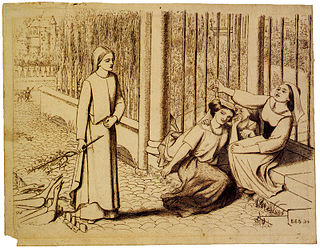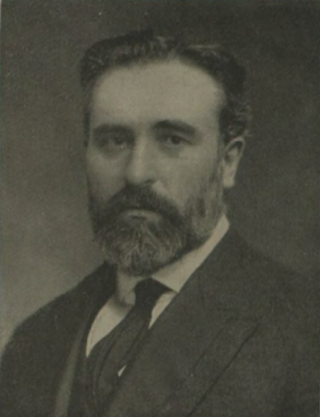Related Research Articles

Elizabeth Barrett Browning was an English poet of the Victorian era, popular in Britain and the United States during her lifetime.

The Inklings were an informal literary discussion group associated with J. R. R. Tolkien and C. S. Lewis at the University of Oxford for nearly two decades between the early 1930s and late 1949. The Inklings were literary enthusiasts who praised the value of narrative in fiction and encouraged the writing of fantasy. The best-known, apart from Tolkien and Lewis, were Charles Williams, and Owen Barfield.
The Bloomsbury Group—or Bloomsbury Set—was a group of associated English writers, intellectuals, philosophers and artists in the first half of the 20th century, including Virginia Woolf, John Maynard Keynes, E. M. Forster and Lytton Strachey. This loose collective of friends and relatives was closely associated with the University of Cambridge for the men and King's College London for the women, and they lived, worked or studied together near Bloomsbury, London. According to Ian Ousby, "although its members denied being a group in any formal sense, they were united by an abiding belief in the importance of the arts." Their works and outlook deeply influenced literature, aesthetics, criticism, and economics as well as modern attitudes towards feminism, pacifism, and sexuality.

Robert Browning was an English poet and playwright whose dramatic monologues put him high among the Victorian poets. He was noted for irony, characterization, dark humour, social commentary, historical settings and challenging vocabulary and syntax.

Scottish literature is literature written in Scotland or by Scottish writers. It includes works in English, Scottish Gaelic, Scots, Brythonic, French, Latin, Norn or other languages written within the modern boundaries of Scotland.
British literature is literature from the United Kingdom of Great Britain and Northern Ireland, the Isle of Man, and the Channel Islands. This article covers British literature in the English language. Anglo-Saxon literature is included, and there is some discussion of Latin and Anglo-Norman literature, where literature in these languages relate to the early development of the English language and literature. There is also some brief discussion of major figures who wrote in Scots, but the main discussion is in the various Scottish literature articles.
The Scottish Renaissance was a mainly literary movement of the early to mid-20th century that can be seen as the Scottish version of modernism. It is sometimes referred to as the Scottish literary renaissance, although its influence went beyond literature into music, visual arts, and politics. The writers and artists of the Scottish Renaissance displayed a profound interest in both modern philosophy and technology, as well as incorporating folk influences, and a strong concern for the fate of Scotland's declining languages.

Pippa Passes is a verse drama by Robert Browning. It was published in 1841 as the first volume of his Bells and Pomegranates series, in a low-priced two-column edition for sixpence, and republished in his collected Poems of 1849, where it received much more critical attention. It was dedicated "most admiringly to the author of Ion", Thomas Noon Talfourd. It is best known for the lines "God's in his heaven— / All's right with the world!"

Ancient Greek comedy was one of the final three principal dramatic forms in the theatre of classical Greece. Athenian comedy is conventionally divided into three periods: Old Comedy, Middle Comedy, and New Comedy. Old Comedy survives today largely in the form of the eleven surviving plays of Aristophanes; Middle Comedy is largely lost, i.e. preserved only in relatively short fragments by authors such as Athenaeus of Naucratis; and New Comedy is known primarily from the substantial papyrus fragments of Menander.

John Mackinnon Robertson was a prolific Scottish journalist, advocate of rationalism and secularism, and Liberal Member of Parliament for Tyneside from 1906 to 1918.

Cubo-Futurism was an art movement, developed within Russian Futurism, that arose in early 20th century Russian Empire, defined by its amalgamation of the artistic elements found in Italian Futurism and French Analytical Cubism. Cubo-Futurism was the main school of painting and sculpture practiced by the Russian Futurists. In 1913, the term ‘Cubo-Futurism’ first came to describe works from members of the poetry group ‘Hylaeans’, as they moved away from poetic Symbolism towards Futurism and zaum, the experimental “visual and sound poetry of Kruchenykh and Khlebninkov”. Later in the same year the concept and style of ‘Cubo-Futurism’ became synonymous with the works of artists within Ukrainian and Russian post-revolutionary avant-garde circles as they interrogated non-representational art through the fragmentation and displacement of traditional forms, lines, viewpoints, colours, and textures within their pieces. The impact of Cubo-Futurism was then felt within performance art societies, with Cubo-Futurist painters and poets collaborating on theatre, cinema, and ballet pieces that aimed to break theatre conventions through the use of nonsensical zaum poetry, emphasis on improvisation, and the encouragement of audience participation.

Peter Neville Frederick Porter OAM was a British-based Australian poet.

Nadezhda Nikolayevna Rimskaya-Korsakova (Russian: Надежда Николаевна Римская-Корсакова listen née Purgold was a Russian pianist and composer as well as the wife of composer Nikolai Rimsky-Korsakov. She was also the mother of Russian musicologist Andrey Rimsky-Korsakov.

Literature is any collection of written work, but it is also used more narrowly for writings specifically considered to be an art form, especially prose fiction, drama, and poetry. In recent centuries, the definition has expanded to include oral literature, much of which has been transcribed. Literature is a method of recording, preserving, and transmitting knowledge and entertainment, and can also have a social, psychological, spiritual, or political role.
English literature is literature written in the English language from the United Kingdom, its Crown Dependencies and Overseas Territories, the Republic of Ireland, the United States, and the countries of the former British Empire. The English language has developed over the course of more than 1,400 years. The earliest forms of English, a set of Anglo-Frisian dialects brought to Great Britain by Anglo-Saxon invaders in the fifth century, are called Old English. Beowulf is the most famous work in Old English, and has achieved national epic status in England, despite being set in Scandinavia. However, following the Norman conquest of England in 1066, the written form of the Anglo-Saxon language became less common. Under the influence of the new aristocracy, French became the standard language of courts, parliament, and polite society. The English spoken after the Normans came is known as Middle English. This form of English lasted until the 1470s, when the Chancery Standard, a London-based form of English, became widespread. Geoffrey Chaucer, author of The Canterbury Tales, was a significant figure in the development of the legitimacy of vernacular Middle English at a time when the dominant literary languages in England were still French and Latin. The invention of the printing press by Johannes Gutenberg in 1439 also helped to standardise the language, as did the King James Bible (1611), and the Great Vowel Shift.
Mary Josephine "Maisie" Ward Sheed, who published under the name Maisie Ward, was a writer, speaker, and publisher. Maisie's brother Leo Ward was co-founder of the publishing house Sheed and Ward; Maisie took his place when Leo left to become a priest.

Scottish literature in the Middle Ages is literature written in Scotland, or by Scottish writers, between the departure of the Romans from Britain in the fifth century, until the establishment of the Renaissance in the late fifteenth century and early sixteenth century. It includes literature written in Brythonic, Scottish Gaelic, Scots, French and Latin.

Poetry of Scotland includes all forms of verse written in Brythonic, Latin, Scottish Gaelic, Scots, French, English and Esperanto and any language in which poetry has been written within the boundaries of modern Scotland, or by Scottish people.

Alexandra Orr or Alexandra Leighton; Alexander Sutherland Orr; Mrs Sutherland Orr was an English biographer of Robert Browning. She was a model for her brother Frederic Leighton in at least two paintings.

Flora Masson RRC was a Scottish-born nurse, suffragist, writer and editor.
References
- 1 2 Murray, H. (2002) Come, bright improvement!: the literary societies of nineteenth-century Ontario p.142. University of Toronto Press. ISBN 0-8020-3633-3. Retrieved October 2011.
- ↑ P. Drew, 1970, The poetry of Browning: a critical introduction P.410. Methuen & Co. ISBN 978-0-416-14470-3 Retrieved October 2011.
- 1 2 3 Kennedy, S.R. & Hair, D.S. (2007) The dramatic imagination of Robert Browning: a literary life p.365-375. University of Missouri Press. ISBN 0-8262-1691-9. Retrieved October 2011.
- 1 2 Elizabeth Lee, "Orr , Alexandra (1828–1903)", rev. Katharine Chubbuck, Oxford Dictionary of National Biography, Oxford University Press, 2004 accessed 30 April 2017
- ↑ Mrs. Sutherland Orr (1887). A Handbook to the Works of Robert Browning. Bell.
